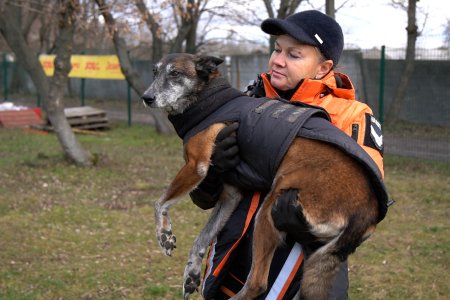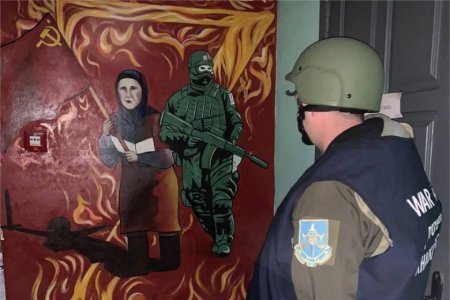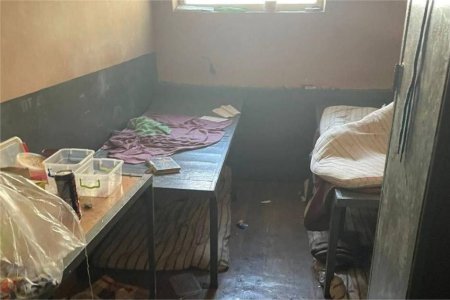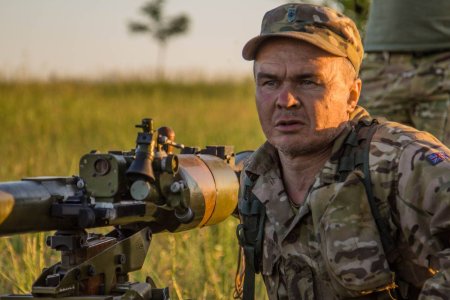My name is Nadiia Mykolaivna. I have been retired for six years now. I worked in the Kyiv metro system for twenty-five years.
Do you remember what happened on 24 February 2022?
At five in the morning, there was a powerful explosion. I rushed to my daughter and said: “What is it, shooting?” A second explosion followed. We immediately called our friends on the phone, and they told us that in Brovary, Russians hit a military unit: then everyone began to say the war had begun.
What happened in the following days?
We were still in Velyka Dymerka. They were constantly shooting, rockets were flying, and we sat in the house until 8 March, and on 9 March, we went to see my sister, who also lives in Velyka Dymerka.

Why didn’t you evacuate immediately?
We did not know what would happen; my daughter begged me. She said, we have a small child, three years old, but I did not want to go. I couldn’t imagine that this would happen. As a result, we spent three weeks in the cellar at my sister’s house. There were 15 of us in the cellar. Another relative came from Kyiv because she thought it would be safer here.
Then the Russian military began to walk around the yards, and we had a small child with us, so we covered his mouth and asked him not to scream.
Will the child be silent? Our guys were on duty, we were dressed, and as soon as we heard that shooting or explosions were starting, we immediately ran to the cellar.
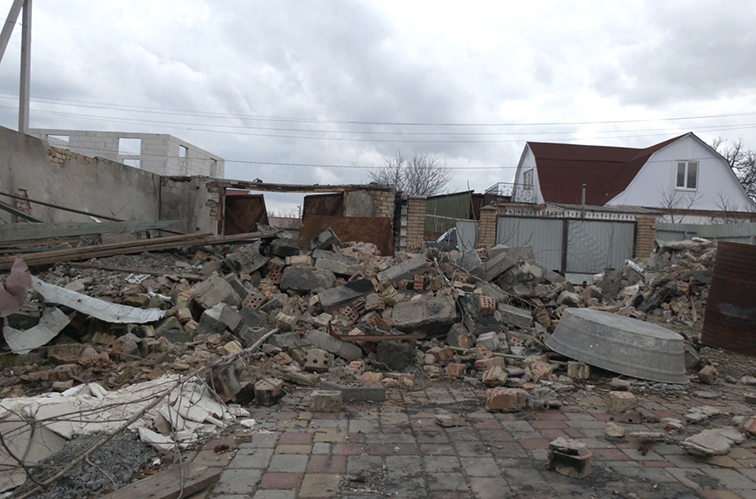
Once, during the shelling, the Russians hit the courtyard next to the cellar where we were hiding, and there was a huge crater. Luckily, it didn’t get into the cellar. The window pane in my sister’s house broke.
When did the Russian military enter Velyka Dymerka?
They entered on 8 March, coming from Tarasivka and Bohdanivka. Further, in the direction of Kyiv, our military did not let them pass, so they got angry and started bombing everything here. They drove around the village in tanks, sat on top, and fired at the houses. Even the earth was trembling.
They fired incendiary projectiles. It smoked, smoldered, but it was impossible to extinguish. And they did it on purpose, not by accident.
A little further down the street, Russians ate chickens and slaughtered pigs: they lived like they were at home. Refrigerators were stolen from people, and even toilets were removed. Carpets were stolen, twisted, and put on their tanks.
How did the Russian military behave during the occupation of Velyka Dymerka?
Two young Russian soldiers came to us looking for men. Meanwhile, our men were hiding in the house. My niece came out to them, and they asked her how many people were there. She said only her elderly uncle, mother, aunt, and children were in the house. The Russians believed.
Then they sat side by side in the gazebo and fired into the air, having fun.
One more time, they came to us on a quad bike and asked for fuel. We gave it to them. What was left to do? So they didn’t search the house. I offered them coffee, but they refused. They were afraid to drink anything from us but took the bread. They said they were contractors. One was a teacher from Ulyanovsk, and the other said he was from an orphanage. Of course, we asked them why they came here. They said they were forced to. Then three more arrived. One said he was a doctor and asked if we needed help. We refused.
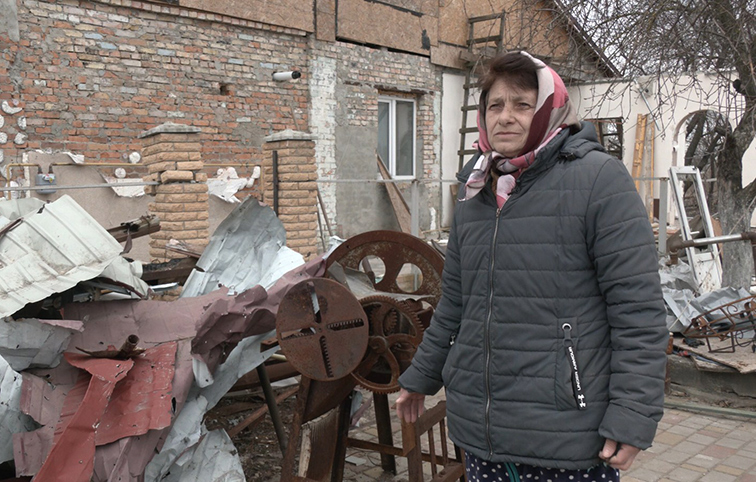
On 21 March, they finally gave us a green corridor, and we began to leave. Everyone gathered in the center of the village. We waited a very long time.
Representatives from the Red Cross arrived, and Russian military vehicles drove in front and behind the bus with civilians. We went through the forests, through Bohdanivka, Pukhivka, near Zazymia, there was already our military, and we reached Brovary as early as 10 pm. We drove for a very long time.
Where were you during the evacuation?
We were in Brovary with relatives of my son-in-law. My sister and daughter also evacuated with us. And then, we went to the Cherkasy region to stay with an acquaintance. Almost completely strangers, but they accepted us. We lived there for three weeks. When Dymerka was released, they didn’t let us in here until the mines were cleared.
Do you know about Russian war crimes during the occupation of Velyka Dymerka?
The man was driving down the street to his sister, and he was shot right in the car. His name is Stupak Sasha.
The Russians shot down another family along Zaliska Street: they were just driving, and they were shot.
People were not allowed to bury their dead. I don’t know how long Sasha Stupak lay on the street before they buried him in the garden. And the elderly grandmother here died right on the road, she lay in the open for a long time, and if it weren’t for the war, she might still have lived ...
How was your home damaged?
The first shelling was on 8 March, the windows flew out on one side, and on 14 March, around 10 in the morning, powerful shelling hit our house. My son-in-law came to the cellar where we were hiding and said there was almost no house or shed. The whole street was destroyed.
What exactly of your property was damaged?
Furniture, refrigerator, stove — explosions damaged everything. Everything burned down: the house, shed, garage, summer kitchen, walk-behind tractor, four bicycles, saws, tools, and dishes.
Does the state help you?
The village council gave us 10 thousand hryvnias. Whose house is more than 80 percent destroyed, received 25 thousand, and we have 72 percent of the destruction, so they gave us 10 thousand. Another French charitable foundation came, and we went to arrange for help: 6,600 hryvnias were given per person. Volunteers were very helpful with food.
What are you planning to do next?
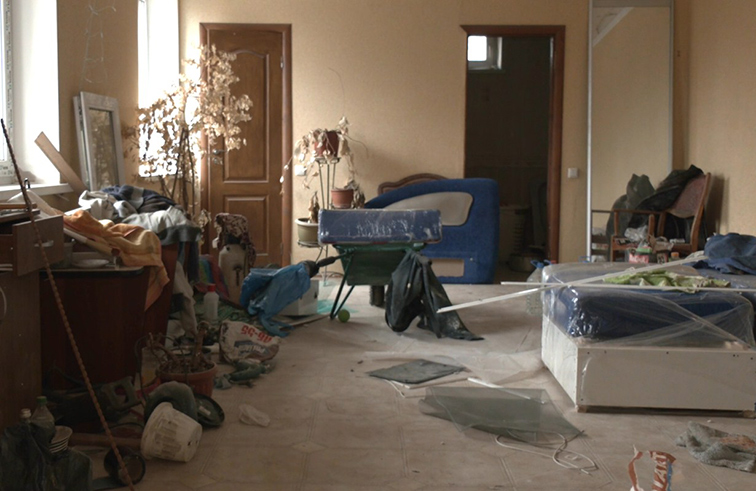
We will repair the house on our own because for a year now, we have been living with strangers, although with my sister, but still, this is not our home, and the children want to go home.
What were your emotions when you discovered Velyka Dymerka had been freed?
What emotions can be? We were glad it was freed, but there was nowhere to return... It’s good that my sister sheltered us, so we live with her.
Could you have thought that there would be a full-scale war?
I didn’t believe it. They said that Putin would attack, but we did not believe it until the last. My husband (he has been gone for 12 years) used to go on a business trip to Smolensk via Moscow. He always said that the Russians are very angry with the Ukrainians, and sooner or later, they will go to war against us. He said this 15 years ago... They generally consider Ukrainians to be nobody.
Has your attitude towards Russians changed?
Of course, it has. Yes, they are against us. We have acquaintances in Moscow, and they do not believe in what is happening in Ukraine now. We ask, did we bomb our own houses? Previously, they did not believe, but now they are gradually beginning to comprehend.
Do you believe that everything will be fine?
I want to believe. I want to believe that everything will be fine. But when?..
